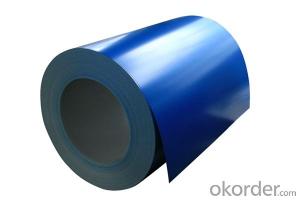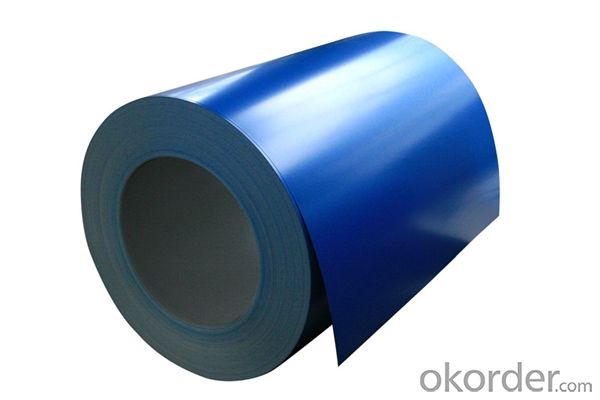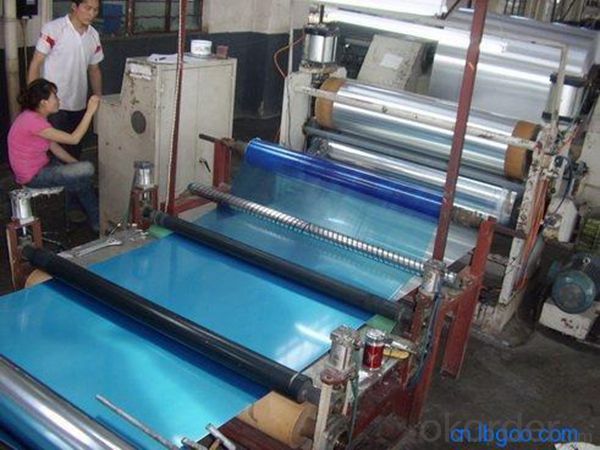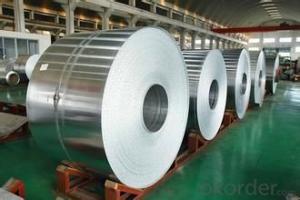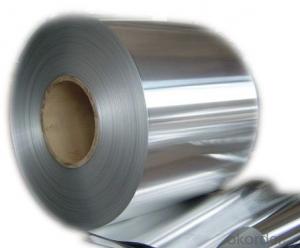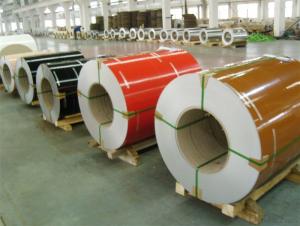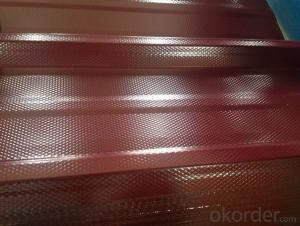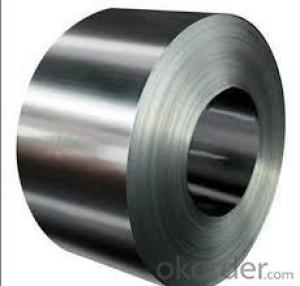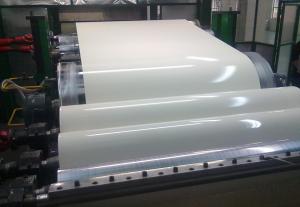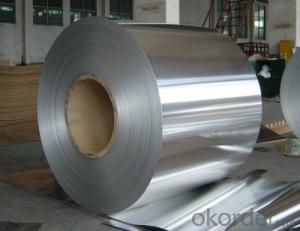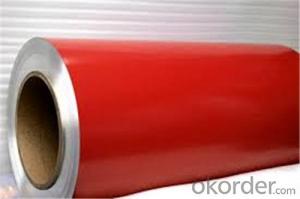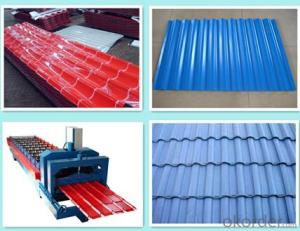Hot Rolled Aluminum Coil for Metal Roofing System - Color Coated
- Loading Port:
- Shanghai
- Payment Terms:
- TT OR LC
- Min Order Qty:
- 5 m.t.
- Supply Capability:
- 10000 m.t./month
OKorder Service Pledge
OKorder Financial Service
You Might Also Like
Specification
1. Specification of Color Coated Aluminum Coil for Metal Roofing System
characteristics | Application |
1) Super peeling strength | 1) Building exterior curtain walls |
2) Excellent surface flatness and smoothness | 2) Decoration and renovation additions for old buildings |
3) Superior weather, corrosion, pollutant resistance | 3) Decoration of interior walls, ceilings, bathrooms, kitchens and balconies |
4) Even coating, various colors | 4) Shop door decorations |
5) Fireproof, excellent heat and sound insulation | 5) Advertisement board display platforms and signboards |
6) Superior impact resistance | 6) Wallboards and ceilings for tunnels |
7) Lightweight and easy to process | 7) Industrial materials, materials for vehicles and boats |
2. Application of Color Coated Aluminum Coil for Metal Roofing System
(1).Interior: wall cladding, ceilings, bathrooms, kitchens and balconies, shutters, doors...
(2).Exterior: wall cladding, facades, roofing, canopies, tunnels,column covers , renovations...
(3).Advertisement: display platforms, signboards, fascia, shop fronts...
3. Feature of Color Coated Aluminum Coil for Metal Roofing System
*Such coil is specially designed to replace aluminum ingot, due to the high export tax of aluminum ingot, the coil has better price than ingot.
*This type of coil can fit customer's remelting furnace just like ingot, no need to make any change to the production line that was previously used for ingot. The standard coil size and weight is very suitable for the feed gate of furnace.
*This type of coil causes less material wastage than ingot when remelted.
*Our coil is made directly from ore, no need to go though the ingot making process, quality is much better than other suppliers who use ingot scrap to make coil.
Be free from Oil Stain, Dent, Inclusion, Scratches, Stain, Oxide Dicoloration, Breaks, Corrosion, Roll Marks, Dirt Streaks and other defect which will interfere with use
4. Certificate:
SGS and ROHS(if client request, paid by client), MTC(plant provided), Certificate of Origin(FORM A, FORM E, CO), Bureau Veritas and SGS (if client request, paid by client), CIQS certificate
5. Image of Color Coated Aluminum Coil for Metal Roofing System
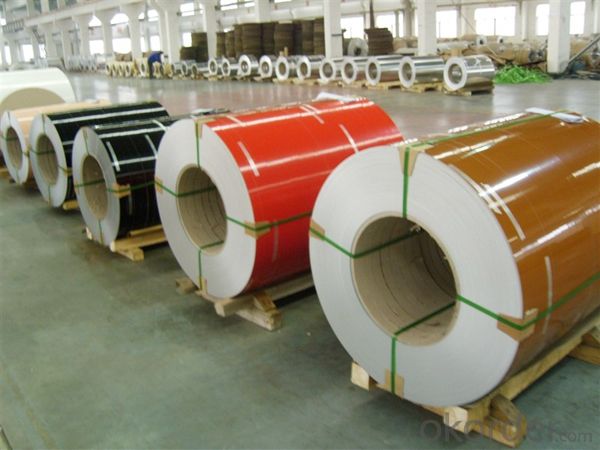
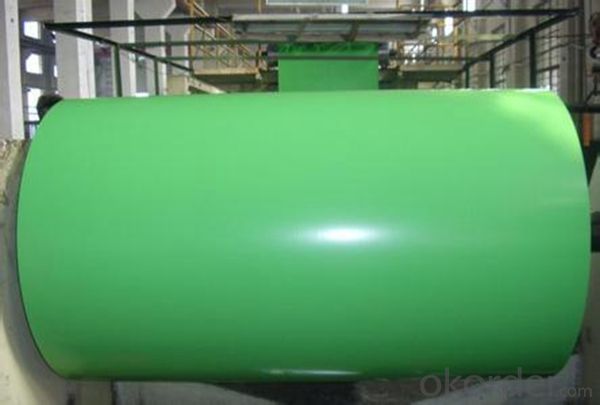
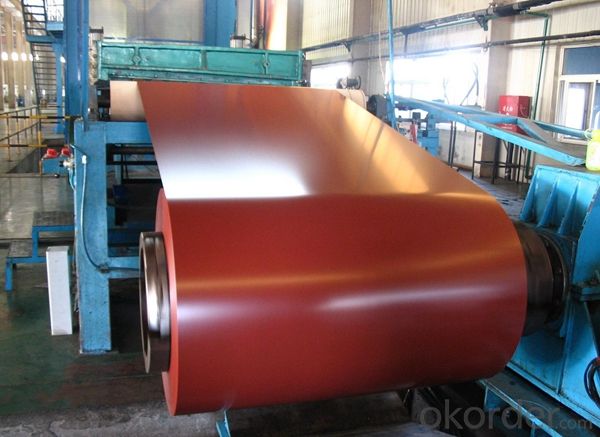
6. Package and shipping of Color Coated Aluminum Coil for Metal Roofing System
eye to wall
eye to the wall
with wood pallet (wooded case also available)
7. FAQ
1) What is the delivery time?
Dpends on actual order, around 20 to 35 days
2)What is the QC system:
We have QC staff of 20 persons and advanced equipment, each production is with MTC traced from Aluminum ingot lot.
3) What market do you mainly sell to?
Australia, America, Asia, Middle East, Western Europe, Africa etc
- Q: What are the production processes of aluminum coil and what are the functions of various industrial furnaces in the production of aluminum? The more detailed, the better. Thank you! Points!
- There are aluminum annealing furnace, aluminum alloy quenching furnace, aging furnace and smelting furnace.
- Q: Is anodized aluminum suitable for indefinite salt-water exposure or will it rust? Also note that it would be used for the hull of a boat (more like a platform), and if it is not suitable could you suggest another metal?
- Aluminum would be an ideal material stainless steel a better one, aluminum does not rust it deteriorates to electrolite when in contact with salt water and a magnetic or ferrus metal. Therefore as long as your boat is fitted with salt water anodes it should create no problems if not it will deteriorate rapidly in salt water. All powered salt water craft/vessels carry anodes ie there is an anode fitted to the aluminum drive leg of an outboard or Z drive if intended for salt water use, On larger ships the anodes are normally fixed to the rudder blade so equip your platform the same. Zink anodes are cheap and available at every salt water chandlers. You should also use non ferrus bolts and screws to screw your construction together with, or to fix it to the hull, or better make a set of jigs to suit shape size and then get it TIG welded never mix ferrus and non ferrus metals in the presence of salt water without a zink anode, the damage is rapid and attacks the structure of the non ferrus metal creating an electric field and destroying the weakest current catalyst ie the aluminum itself. The non ferrus metals that in general maritime use that are are not so much effected by salt water are phosphor bronze, brass,and copper.Non of these would be suitable for making your platform, therefore aluminum. If weight is not a problem though i would recommend a middle grade stainless steel such as se 80 or around that grade, And again it would be better to be TIG welded than bolted together, bolts are subject to movement (especially at sea) and therefore hole enlargement. As are safety standard pop rivets.
- Q: Are aluminum coils suitable for outdoor signage?
- Indeed, outdoor signage can be made using aluminum coils. This material, known for its exceptional durability and resistance to weather conditions, is an ideal choice for outdoor applications. Its corrosion resistance ensures that it will not deteriorate or rust when exposed to rain, snow, sunlight, or other elements. Moreover, aluminum coils are lightweight and flexible, facilitating effortless installation and customization. They can be effortlessly cut, shaped, and painted to produce captivating and enduring outdoor signage. Overall, aluminum coils are widely favored for outdoor signage due to their resilience, ability to withstand the elements, and aesthetic allure.
- Q: How are aluminum coils used in the production of power transmission lines?
- Due to their unique properties and benefits, aluminum coils are extensively used in the production of power transmission lines. These coils, typically made from high-quality aluminum alloys, offer excellent conductivity, strength, and corrosion resistance. A key application of aluminum coils in power transmission lines is their use in manufacturing overhead conductors. These conductors transmit electrical energy from power plants to substations and distribution networks. Aluminum coils are used to create the conductive core of these overhead conductors because aluminum has lower resistance compared to metals like copper. This low resistance allows for efficient electricity transmission over long distances, minimizing energy loss and improving system performance. In addition, aluminum coils are lighter than copper coils, making them easier to handle and install. This characteristic significantly reduces transportation, installation, and maintenance costs of power transmission lines. Consequently, aluminum coils have become the preferred choice for overhead conductors in power transmission systems worldwide. Moreover, the corrosion resistance of aluminum coils ensures the long-term durability and reliability of power transmission lines. Aluminum naturally develops a protective oxide layer that prevents further corrosion, even in harsh environmental conditions. This corrosion resistance extends the lifespan of transmission lines, reducing the need for frequent repairs or replacements. In conclusion, aluminum coils play a vital role in the production of power transmission lines. They enable efficient electricity transmission, reduce costs, and provide long-lasting corrosion resistance. With these advantages, aluminum coils have become widely adopted in the power industry to enhance the performance and reliability of power transmission systems.
- Q: What are the different pre-treatment methods for aluminum coils?
- Aluminum coils can undergo various pre-treatment methods to prepare their surface for further processing or coating. These methods serve different purposes and can be chosen based on specific requirements. One pre-treatment method is degreasing, which eliminates oils or greases on the coil surface. Solvents or alkaline cleaners are used for degreasing, depending on the application's needs. Etching is another pre-treatment method that removes surface oxides or contaminants from the aluminum coils. This can be achieved through acidic solutions or mechanical techniques like sandblasting or brushing. Phosphating, a commonly used pre-treatment method, involves applying a phosphate coating to the coil surface. This coating enhances adhesion for subsequent coatings or paints and provides corrosion resistance. Conversion coating is a popular pre-treatment method that forms thin layers of inorganic compounds on the coil surface. These coatings improve adhesion for subsequent coatings or paints and offer corrosion resistance. Common conversion coatings for aluminum include chromate, chromate-free, or anodizing. To summarize, the pre-treatment methods for aluminum coils include degreasing, etching, phosphating, and conversion coating. Each method has a specific purpose in preparing the coil surface for further processing or coating, chosen based on the application's requirements.
- Q: What are the common sizes of aluminum coils available?
- The common sizes of aluminum coils available vary depending on the specific application and industry. However, some standard sizes include widths ranging from 36 inches (91 cm) to 72 inches (183 cm) and thicknesses between 0.019 inches (0.048 cm) to 0.125 inches (0.318 cm). These sizes are commonly used in industries such as construction, automotive, and manufacturing.
- Q: Can aluminum coils be used in solar energy systems?
- Yes, aluminum coils can be used in solar energy systems. Aluminum is a commonly used material in the construction of solar panels and solar energy systems due to its excellent properties. Aluminum coils are lightweight, durable, and have excellent thermal conductivity, making them ideal for transferring heat away from the solar cells. Additionally, aluminum is resistant to corrosion, which is crucial for outdoor applications where solar panels are exposed to various weather conditions. The use of aluminum coils in solar energy systems helps improve the overall efficiency and lifespan of the panels, contributing to the effectiveness and sustainability of solar energy generation.
- Q: An they say aluminum can cause breast cancer in some.
- You bet it does......its a compound called aluminum chlorhydrate. Its made by reacting aluminum with hydrochloric acid. Actually they use aluminum hydroxide to prevent a potential explosion hazard during the manufacturing process. Aluminium-based complexes (chlorhydrates) react with the electrolytes in the sweat to form a gel plug in the duct of the sweat gland. The plugs prevent the gland from excreting liquid and are removed over time by the natural sloughing of the skin. The aluminum salts interact with the keratin fibrils in the sweat ducts and form a physical plug that prevents sweat from reaching the skin’s surface. Aluminum salts also have a slight astringent affect on the pores; causing them to contract, further preventing sweat from reaching the surface of the skin. The blockage of a large number of sweat glands reduces the amount of sweat produced in the underarms, though this may vary from person to person. Aluminum is considered a heavy metal and has been shown (in its elemental form only) to alter the physiology of the blood-brain barrier. Antiperspirants are considered drugs by the FDA and no test yet performed shows a link between Aluminum chlorhydrate and breast cancer, brain cancer or any other cancer for that matter. Hey, you asked......
- Q: Can aluminum coils be used for sound insulation?
- No, aluminum coils are not typically used for sound insulation as they do not possess the necessary properties to effectively reduce or block sound transmission.
- Q: What are the different surface finishes for pre-painted aluminum coils?
- There are several different surface finishes available for pre-painted aluminum coils. These finishes are applied to the aluminum surface to enhance its appearance, durability, and resistance to external factors. Some of the common surface finishes for pre-painted aluminum coils include: 1. Polyester (PE) Finish: This is the most widely used surface finish for pre-painted aluminum coils. It offers good durability, weather resistance, and color retention. Polyester finishes are available in a wide range of colors and gloss levels. 2. Polyvinylidene Fluoride (PVDF) Finish: PVDF coatings provide excellent resistance to weathering, UV radiation, and chemical exposure. These finishes are highly durable and maintain their color and gloss for extended periods. PVDF finishes are often used in architectural applications where color retention and longevity are important. 3. Polyurethane (PU) Finish: Polyurethane coatings offer good resistance to abrasion, chemicals, and weathering. They provide a smooth and glossy appearance and are available in a wide range of colors. PU finishes are commonly used in applications that require high durability and resistance to outdoor conditions. 4. Epoxy (EP) Finish: Epoxy coatings provide excellent chemical resistance and adhesion. They are often used in industrial applications where corrosion resistance is crucial. Epoxy finishes can be combined with other coatings, such as polyester or PVDF, to enhance their performance. 5. Acrylic (AC) Finish: Acrylic coatings offer good weather resistance and color retention. They are often used in architectural applications where aesthetics and durability are important. Acrylic finishes provide a glossy appearance and are available in a wide range of colors. These are just a few examples of the different surface finishes available for pre-painted aluminum coils. The choice of finish depends on the specific requirements of the application, including the desired appearance, durability, and resistance to external factors.
Send your message to us
Hot Rolled Aluminum Coil for Metal Roofing System - Color Coated
- Loading Port:
- Shanghai
- Payment Terms:
- TT OR LC
- Min Order Qty:
- 5 m.t.
- Supply Capability:
- 10000 m.t./month
OKorder Service Pledge
OKorder Financial Service
Similar products
Hot products
Hot Searches
Related keywords
